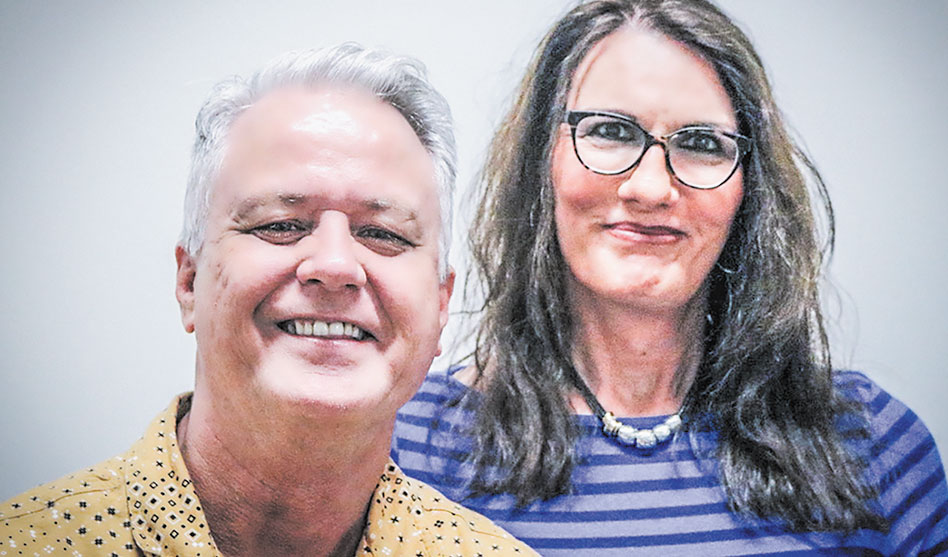Charles Fowler and Blair High
PsyT encourages discussion and research into use of psychedelics for depression, PTSD and more
DAVID TAFFET | Senior Staff Writer
taffet@dallasvoice.com
Blair High likes to help people overcome adversity. When she started the GEAR program at Resource Center, it was cutting edge. Known for its awards program, GEAR not only affirmed transgender people were ok, but awarded them for their accomplishments. The list of speakers didn’t just include trans people who persevered through adversity; it also included people like Amanda Simpson, who had just been appointed deputy assistant secretary of defense, the highest-ranking politically-appointed trans person at the time.
Today, High is helping people in another cutting edge way — as a coordinator of the Psychedelic Society of Texas, or PsyT, offering education, harm reduction and healing by developing community, discussion and bringing in top-notch speakers. Those speakers have included Timothy Leary’s son, who spoke to the Austin PsyT group earlier this week, and, coming in September, comedian Stuart Preston, also known as The Stoned Ape, who will perform in Plano.
Charles Fowler has been working with PsyT for several years. “People come to this group for different reasons,” he said. “My dad died from Alzheimers,” and dealing with his father’s dementia was a difficult experience. While looking into research studies going on, he came across PsyT, and psychedelics helped him deal with his father’s long illness and death.
But Fowler also learned the Veterans Administration was doing research into how psychedelics were helping people who had returned from war and were suffering from PTSD. And through discussions at PsyT meetings, he learned how these drugs are helping trans people who have lost their families, friends, jobs and more just by coming out. And he has learned how gays and lesbians who dealt with the trauma of being thrown out of their homes when they came out in their teens have been helped.
“They found they were able to work through trauma, whether from childhood or war-inflicted,” he said.
Fowler said current use of psychedelics involves micro-dosing. Initial usage might last three hours instead of six, with the effects lasting maybe six weeks. That can be extended with small amounts being taken subsequently, the same way other medications are prescribed.
“People don’t get a hangover or feel the bad side-effects they do on anti-depressants or bipolar meds,” Fowler said of those using psychedelics. “They aren’t walking around in a fog.”
High, noting that the group holds monthly meetings, said she came to the PsyT because she was dealing with depression. “A lot of studies have been done with micro-dosing to get off anti-depressants,” she said. “And it’s good for pain management. I think there’s a lot of people in our community we can help.”
High emphasized that PsyT is an information and discussion group. Don’t expect to come to a meeting to score drugs.
“PsyT does not hold ceremonies or promote illegal activities during our events,” reads a warning on the website. “This is not a place to seek, encourage or participate in the procurement of controlled substances.”
While everyone interested is invited to attend, you must agree not to contact anyone at PsyT for such things or engage in any such activities at any PsyT event.
“There’s a stigma just about attending one of our meetings,” High said, explaining that some people feel shame just about coming to one of the meetings. And yet there’s been quite a bit of interest from healthcare providers who want more information on getting their patients off other medications and treating all forms of PTSD.
“The stigma goes back to Nixon and the ’70s war on drugs,” High said. “It’s all political.”
Fowler said there’s quite a bit of interest from drug companies, as well. They’re researching what they can take from the variety of ingredients naturally grown in plants to patent and apply as a next generation treatment for PTSD, depression, bipolar and other mental disorders.
He said a good way to hear about what psychedelics can do for someone is to come hear comedian Stuart Preston. “He talked about his life growing up, and he was funny,” Fowler said. “Then he talked about his family. When his son committed suicide, the family thought he caused it, and they disowned him.” When nothing else worked for his depression, Preston tried a psychedelic.
The show ends with Preston talking about hope and forgiveness, and Fowler said after the show, they’ll do a panel and take questions from the audience.
“We’d love to have new people from the community,” High said. “Are you tired of being angry? There are other ways to deal with your fear and anger.”
Fowler talked about the hope he’s seen from use of psychedelics.
“One veteran couldn’t couldn’t handle being back from Afghanistan,” he said about someone who attended their last meeting. “Three weeks ago, he was going to kill himself.”
But he tried one of the naturally-occurring psychedelics that had helped other veterans with PTSD and is no longer suicidal. More than anything, PsyT encourages more research and clinical trials.
For more information on PsyT and to get tickets to see The Stoned Ape Show, with comedian Stuart Preston, visit PsyTexas.com. Stuart Preston appears at the Art Center Theater, 1400 Summit Ave., Plano on Sept. 17 at 6:30 p.m. Advance tickets are $25.

















